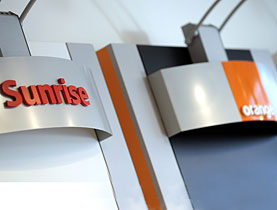Mobile phone merger raises consumer fears

The proposed merger of mobile telephone companies Orange Switzerland and Sunrise has raised questions about competition and the impact on customers.
The companies involved insist the merger would create a more potent competitor to market leader Swisscom, but critics fear a duopoly could dilute eagerness to give end-users the best deal.
If the plan gets the go-ahead from regulators, it would effectively result in Orange – a subsidiary of France Telecom – taking over Danish-owned Sunrise. France Telecom would pay €1.5 billion (SFr2.26 billion) for a 75 per cent stake in the new business venture.
The Swiss telecommunications market has met with frequent criticism over its under-regulation and only half-hearted attempts to truly liberalise the sector. Some observers have even been moved to suggest that fully opening the industry is not in the interests of state-dominated Swisscom that enjoys a 62 per cent market share.
A report by the Federal Communications Office last year showed that Swiss mobile phone users pay a third more than counterparts in Europe.
Sunrise and Orange were at pains to portray the merger as the best way to eat into Swisscom’s dominance of the market.
Catastrophe or opportunity?
Sunrise chief executive Christoph Brand said it was the “logical way for us to improve our competitive position in the Swiss market and create a better offering for our customers”. For Thomas Sieber, CEO of Orange Switzerland, it presented “fabulous opportunities”.
However, comments from many observers ranged from the outright hostile to the ambivalent.
Former price watchdog supervisor Rudolf Stahm, who is still active in the media, said the merger would be a “catastrophe”. But his successor, Stefan Meierhans, took a more considered “wait and see” approach, while expressing some concerns about possible negative outcomes.
Organisation for Economic Co-operation and Development (OECD) telecoms expert Taylor Reynolds told swissinfo.ch that three competitors would almost certainly be better than two.
“Duopolies in the telecoms sector almost never work because the providers have no incentive to compete on price,” he said. “The best strategy is to differentiate on services, but never to enter into a price war.”
Regulation fingered
Matthias Finger, a professor from the Federal Institute of Technology in Lausanne (EPFL), urged regulators to show a firmer hand than in the past. He argued that leaving providers to their own devices would not benefit customers.
“In the short term there will be some moral pressure on all providers to deliver for consumers. But that might not last long unless the regulatory framework becomes more solid and serious,” he told swissinfo.ch.
The authorities have occasionally bared their teeth – most notably by fining Swisscom for overcharging rivals to use its mobile phone connections and for its internet service pricing – but Finger wants more consistent resolve in future.
“The regulators have so far been too lenient and have failed to create meaningful competition in the telecommunications sector.”
The Competitions Commission was remaining tight-lipped on how it would view the proposed merger of the two largest competitors to Swisscom. But Communications Minister Moritz Leuenberger risked incurring the wrath of more sceptical political colleagues by giving the proposal a cautious welcome.
“If the fusion takes place in future, we would have a stronger competitor to Swisscom – surely a stronger player than we have had with the two separate parties,” he told Swiss public radio.
“Stoic loyalty”
Many observers had commented on how difficult both Orange and Sunrise were finding it to break Swisscom’s iron grip in Switzerland by themselves. The 2008 Federal Communications Office had noted the “stoic loyalty” of conservative Swisscom customers and their unwillingness to jump ship even for lower rates.
If the merger goes ahead, the new provider would have a 38 per cent market share compared with Swisscom’s 62 per cent dominance of the market. At present, both Orange and Sunrise each command roughly 19 per cent of the sector.
It is widely predicted that France Telecom would then take up the option to buy out the remaining 25 per cent stake in the new enterprise from Danish company TDC (the current owner of Sunrise) by an agreed date of 2014.
Matthew Allen, swissinfo.ch
Swisscom is the dominant player in the Swiss telecoms market with a 62% share of the mobile phone market. The Swiss government has a 62% controlling stake in the company and moves towards privatisation were quashed by parliament in 2006.
Swisscom has the largest coverage of any telecoms provider in Switzerland, reaching nearly 5.5 million customers.
The company employs 19,704 staff and generated SFr12.2 billion in net revenues and posted EBIDTA (income before tax, depreciation, amortization and impairment) of SFr4.8 billion in 2008.
Sunrise is the second largest telecoms provider in Switzerland and started life in 1996 as Newtelco before being renamed after it was taken over by Denmark’s TDC in 2000.
Sunrise reaches 1.82 million customers in Switzerland and employs around 1,500 staff.
Orange Switzerland is a fully owned subsidiary of France Telecom and entered the Swiss market in 1999. It reaches around 1.57 million customers and has 1,151 employees.
The combined revenues of both groups were SFr3.1 billion in 2008 with EBIDTA operating income of SFr809 million.

In compliance with the JTI standards
More: SWI swissinfo.ch certified by the Journalism Trust Initiative











You can find an overview of ongoing debates with our journalists here . Please join us!
If you want to start a conversation about a topic raised in this article or want to report factual errors, email us at english@swissinfo.ch.